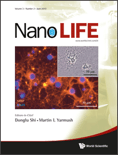
Nano LIFE
metrics 2024
Transforming healthcare with cutting-edge nano research.
Introduction
Nano LIFE, published by World Scientific Publishing Company, is a multidisciplinary journal that delves into the dynamic fields of bioengineering, biomedical engineering, and pharmaceutical science, providing a platform for researchers to disseminate their cutting-edge findings. With an ISSN of 1793-9844 and e-ISSN 1793-9852, this journal emphasizes the significance of nanoscale research in healthcare and technology, positioning itself as a vital resource for professionals and academics alike. Although currently categorized in the Q4 quartile for multiple scientific disciplines in 2023, its unique focus on the intersection of nanotechnology and life sciences aims to elevate the discourse in these rapidly evolving sectors. Researchers can anticipate publishing innovative methodologies and results, contributing to the overall understanding and application of nanotechnology in medicine. Located in Singapore, Nano LIFE not only serves the global research community but also reflects the growing interest in nanotechnology across diverse fields.
Metrics 2024
 0.12
0.12 0.80
0.80 0.70
0.70 2
2Metrics History
Rank 2024
Scopus
IF (Web Of Science)
JCI (Web Of Science)
Quartile History
Similar Journals

Journal of Nanostructure in Chemistry
Pioneering Insights into Nanostructured ChemistryThe Journal of Nanostructure in Chemistry, published by Springer Heidelberg, stands at the forefront of nanotechnology and its applications in the field of chemistry. With an impressive Q1 ranking in Chemistry (Miscellaneous) as of 2023, this journal offers a platform for disseminating groundbreaking research and innovative practices that shape the future of nanostructured materials. Recognized among the top-tier publications in its category—with a commendable 96th percentile ranking in Scopus—this journal provides researchers, professionals, and students alike with invaluable insights into the intricate interplay between nanoscale structures and chemical principles. Despite being a non-open access platform, its commitment to high-quality, peer-reviewed content continues to drive scientific discourse and collaboration within the international research community. The Journal of Nanostructure in Chemistry, which spans from 2013 to 2024, is dedicated to advancing knowledge and fostering innovation in nanochemistry, making it an essential resource for anyone looking to stay ahead in this rapidly evolving discipline.
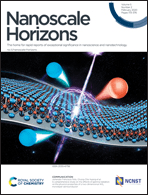
Nanoscale Horizons
Catalyzing Collaboration in Nanoscale InnovationsNanoscale Horizons is an esteemed journal published by the Royal Society of Chemistry, focusing on cutting-edge research in the field of nanoscale materials and their applications. Established in 2016, this journal quickly gained prominence, achieving a Q1 ranking in Materials Science (miscellaneous) and a notable rank of #32 out of 463 in the Scopus index, placing it in the 93rd percentile among its peers. With its rigorous peer-review process and commitment to disseminating high-impact research, Nanoscale Horizons serves as a vital platform for sharing innovative discoveries and interdisciplinary advancements. Researchers and professionals are invited to explore the exciting developments in nanotechnology through this publication, fostering collaboration and knowledge exchange in an ever-evolving field. Though currently not open access, the journal ensures that significant research findings are made available to a diverse audience keen on advancing materials science.
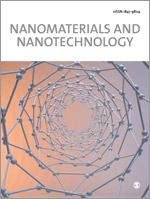
Nanomaterials and Nanotechnology
Pioneering Discoveries in Materials ScienceNanomaterials and Nanotechnology is a premier journal published by HINDAWI LTD, dedicated to advancing knowledge in the rapidly evolving fields of nanomaterials and nanoscale applications. Established as an Open Access platform since 2011, the journal aims to disseminate high-quality research that provides insights into nanotechnology's manifold aspects, including biotechnology, ceramics and composites, as well as electrical and electronic engineering. With a compelling impact factor reflected in its robust Scopus rankings—placing it in the 80th percentile in Engineering and the 72nd percentile in Biotechnology—it stands as a key resource for researchers, professionals, and students seeking to stay at the forefront of innovation in materials science. The journal occupies a distinguished position in the academic community, featuring studies that explore the synthesis, characterization, and application of nanomaterials, thereby contributing significantly to scientific discourse and technological advancement in this critical area.

Physical and Chemical Aspects of the Study of Clusters Nanostructures and Nanomaterials
Exploring the Nanoscopic World of InnovationPhysical and Chemical Aspects of the Study of Clusters, Nanostructures, and Nanomaterials is an esteemed open-access journal published by TVER STATE UNIVERSITY, dedicated to advancing the scientific discourse surrounding the intricate interplay of physical and chemical properties in nanostructure materials. Launched in 2017, this journal provides a vital platform for researchers, professionals, and students to disseminate and access cutting-edge findings in the rapidly evolving fields of nanotechnology and materials science. With an ISSN of 2226-4442 and an E-ISSN of 2658-4360, it aims to bridge the gap between academic research and practical applications. By facilitating open access to high-quality research, the journal plays an essential role in promoting innovative solutions to contemporary challenges in engineering, materials development, and related industries. The journal's scope includes but is not limited to the synthesis, characterization, and functionalization of nanomaterials, ensuring comprehensive coverage of this multidisciplinary field.
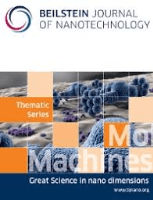
Beilstein Journal of Nanotechnology
Advancing the frontiers of nanotechnology research.The Beilstein Journal of Nanotechnology is a prominent open access journal published by the Beilstein Institute that has been at the forefront of nanotechnology research since its inception in 2010. With a focus on cutting-edge developments in areas such as Electrical and Electronic Engineering, Materials Science, and Physics and Astronomy, this journal is ranked in the Q2 category across multiple scientific disciplines, reflecting its significant impact within the research community. The journal is accessible to a global audience and aims to foster innovation and application of nanotechnology across various fields. Featuring a rich convergence of interdisciplinary studies, the Beilstein Journal of Nanotechnology offers a platform for researchers to share their findings, thus advancing the frontiers of knowledge in this dynamic field. With publishers based in Frankfurt am Main, Germany, it continues to contribute to the scientific dialogue on nanoscience and its practical applications, making it an essential resource for academics, professionals, and students eager to stay at the cutting edge of technology.
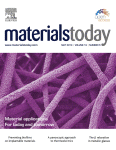
Materials Today
Elevating Research Standards in Mechanical EngineeringMaterials Today is a premier academic journal published by Elsevier Science Ltd, specializing in the dynamic fields of materials science, mechanical engineering, and condensed matter physics. Established in 1999, the journal has garnered an enviable reputation, consistently ranking in the Q1 category across multiple disciplines including mechanics of materials and general materials science, reflecting its influence and high-quality research output. With an impressive Scopus ranking—4th in both mechanical engineering and mechanics of materials, and 6th in condensed matter physics—Materials Today serves as an essential resource for researchers, professionals, and students seeking to stay at the forefront of developments in material innovations and applications. The journal is known for its commitment to publishing significant research findings and reviews, making it a vital platform for disseminating knowledge and fostering collaboration in the rapidly evolving materials field. Although it does not offer open access, its robust impact factor underscores the importance of the content published, ensuring wide visibility and citation among the academic community. Explore the rich tapestry of materials research with Materials Today, where groundbreaking insights pave the way for future technological advancements.

ChemNanoMat
Fostering Collaboration in Cutting-Edge ResearchChemNanoMat is a prestigious academic journal published by WILEY-V C H VERLAG GMBH, dedicated to the rapidly evolving fields of nanoscale materials and their applications in diverse areas such as biomaterials, energy engineering, and environmental sustainability. With the journal's ISSN 2199-692X and recognized quality, as evidenced by its Q2 rankings across multiple categories—including Biomaterials and Renewable Energy—ChemNanoMat serves as a crucial platform for researchers, professionals, and students to disseminate their findings and foster collaborations. Operating from Germany, the journal encourages the exploration of innovative materials solutions to meet tomorrow's challenges. While it does not currently offer open access options, it remains highly regarded in the academic community with a competitive impact factor that emphasizes its relevance and influence in guiding future research directions. Covering a broad scope from 2015 through 2024, ChemNanoMat is key for anyone invested in the advancement of materials chemistry and related scientific fields.

Digest Journal of Nanomaterials and Biostructures
Connecting Science Through Nanomaterials and BiostructuresThe Digest Journal of Nanomaterials and Biostructures, published by VIRTUAL CO PHYSICS SRL, is a premier open-access journal since 2006, focusing on the dynamic intersections of nanotechnology, biostructures, and material science. Based in Romania, this journal caters to a diverse readership of researchers, professionals, and students in fields such as nanoscience, biomedical engineering, and condensed matter physics. Despite its current Q4 ranking in multiple categories, including Atomic and Molecular Physics and Structural Biology, the journal serves as a valuable platform for disseminating innovative research and fostering collaboration across scientific disciplines. The journal’s commitment to open access ensures that groundbreaking findings in nanomaterials are readily available to a global audience, reflecting the increasing importance of interdisciplinary research in addressing contemporary challenges. With its ongoing evolution and the potential for high-impact contributions to the scientific community, Digest Journal of Nanomaterials and Biostructures plays a crucial role in advancing knowledge and innovation in its respective fields.
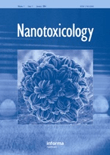
Nanotoxicology
Transforming Insights into Nanotoxicological ResearchNanotoxicology is a pioneering journal published by Taylor & Francis Ltd, dedicated to the critical examination of the toxicity of nanomaterials and their implications in biomedical engineering, nanoscience, and toxicology. With an ISSN of 1743-5390 and E-ISSN of 1743-5404, this journal has established itself as a significant player in its field since its inception in 2007. Classified within the Q2 category for 2023 in major categories such as Biomedical Engineering, Nanoscience and Nanotechnology, and Toxicology, it reflects its robust impact across interdisciplinary research. Notably, its Scopus rankings position it in the top percentile, underscoring its influence in pharmacology and toxicology. The journal offers scholars, researchers, and professionals a platform for sharing pioneering studies and reviews, thereby advancing the understanding of nanomaterial interactions with biological systems. Published from the United Kingdom, Nanotoxicology recognizes the growing importance of nanotechnology in health and environmental contexts, making it an essential resource for anyone engaged in this rapidly evolving field.

RSC Advances
Exploring Cutting-Edge Discoveries in Chemical SciencesRSC Advances, published by the Royal Society of Chemistry, is a leading open-access journal that has been a prominent platform for cutting-edge research since its inception in 2011. Recognized globally for its rigorous peer-review process, RSC Advances serves the dynamic fields of Chemical Engineering and Chemistry, holding prestigious rankings within the top quartile of academic journals in both areas. With its impact factor reflecting a growing influence, the journal currently occupies the Q1 category in Chemical Engineering and Q2 in Chemistry as of 2023. Researchers and professionals will find RSC Advances an essential resource for innovative studies and applications that advance scientific knowledge. Additionally, as an open access journal since 2017, it affords wider visibility and accessibility to groundbreaking research, fostering collaboration and engagement in the scientific community. Situated in Cambridge, UK, RSC Advances remains committed to its objective of disseminating high-quality research that catalyzes progress across various disciplines.